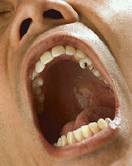- The Best Time of Day to Drink Bone Broth to Maximize Health Benefits
- 8 Ways to Increase Dopamine Naturally
- 7 Best Breads for Maintaining Stable Blood Sugar
- Gelatin vs. Collagen: Which is Best for Skin, Nails, and Joints?
- The Long-Term Effects of Daily Turmeric Supplements on Liver Health
- Could Your Grocery Store Meat Be Causing Recurring UTIs?
- Are You Making This Expensive Thermostat Error This Winter?
- Recognizing the Signs of Hypothyroidism
- 10 Strategies to Overcome Insomnia
- Could Artificial Sweeteners Be Aging the Brain Faster?
Low-Power Laser May Trigger Tooth Repair


A low-power laser can trigger stem cells in the body to repair teeth in mice, researchers report.
The laser prompted dental stem cells to form dentin, the hard material that is similar to bone and provides most of a tooth’s structure.
The findings appear in the May 28 issue of Science Translational Medicine.
This research could lead to the development of noninvasive laser therapy that could dramatically change dental treatment, report the study authors.
This technique “does not introduce anything new to the body, and lasers are routinely used in medicine and dentistry, so the barriers to clinical translation are low,” study leader David Mooney, a faculty member at the Wyss Institute for Biologically Inspired Engineering at Harvard University, said in a university news release.
“It would be a substantial advance in the field if we can regenerate teeth rather than replace them,” added Mooney, who is also a professor of bioengineering at Harvard’s School of Engineering and Applied Sciences.
This type of laser therapy may also prove useful in other cases that require tissue regeneration, such as wound healing and bone repair, according to the researchers.
“The scientific community is actively exploring a host of approaches to using stem cells for tissue regeneration efforts, and Dave and his team have added an innovative, noninvasive and remarkably simple but powerful tool to the toolbox,” Wyss Institute Founding Director Dr. Don Ingber said in the news release.
While research involving animals often fails to provide similar results in humans, planning for clinical trials to test the laser therapy in people is underway.
More information
The U.S. National Library of Medicine has more about dental health.
Source: HealthDay
Copyright © 2026 HealthDay. All rights reserved.










